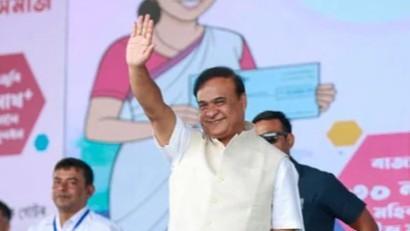
Assam CM Helped Nitish Work Out ₹10,000 for Women Scheme: Report
In a recent development, it has come to light that Assam Chief Minister Himanta Biswa Sarma played a significant role in helping Bihar Chief Minister Nitish Kumar’s government devise a scheme to provide ₹10,000 to women. According to reports, a large part of the credit for Bihar’s Mukhyamantri Mahila Rojgar Yojana, which aims to provide financial assistance to women, goes to Sarma. This revelation has sparked interest in the collaborative efforts between state governments and the exchange of ideas that can lead to innovative policy-making.
The story behind this development is quite intriguing. It is reported that five months ago, the Nitish Kumar government in Bihar reached out to the Assam government, seeking their expertise and guidance on implementing a scheme similar to the ‘Jeevika ₹10,000 model’ that has been successful in Assam. In response, Sarma sent a team of bureaucrats from Assam to Bihar, who made a presentation before the officials of the Bihar government. This presentation highlighted the key features and benefits of the ‘Jeevika ₹10,000 model’, which was then incorporated into the Mukhyamantri Mahila Rojgar Yojana.
The ‘Jeevika ₹10,000 model’ is an initiative that was launched by the Assam government, with the aim of providing financial assistance to women in the state. The model has been successful in empowering women and promoting economic growth in Assam, and it was this success that caught the attention of the Bihar government. By sending a team of bureaucrats to Bihar, Sarma facilitated the exchange of ideas and expertise between the two states, which ultimately led to the development of the Mukhyamantri Mahila Rojgar Yojana.
The Mukhyamantri Mahila Rojgar Yojana is a scheme that aims to provide ₹10,000 to women in Bihar, with the goal of promoting economic empowerment and self-reliance among women. The scheme is expected to benefit a large number of women in the state, and it is seen as a significant step towards promoting gender equality and women’s empowerment. The fact that the scheme was developed with the help of the Assam government highlights the importance of inter-state cooperation and the exchange of ideas in policy-making.
This development is also significant because it highlights the role of state governments in promoting economic growth and development. In India, state governments have a significant amount of autonomy in terms of policy-making, and they often have to devise innovative solutions to address the unique challenges faced by their states. By collaborating with each other and sharing their expertise, state governments can learn from each other’s experiences and develop more effective policies.
The collaboration between the Assam and Bihar governments is also a testament to the growing trend of cooperative federalism in India. Cooperative federalism refers to the idea of different levels of government working together to achieve common goals and address shared challenges. In recent years, there has been a growing recognition of the importance of cooperative federalism in promoting economic growth and development, and the collaboration between the Assam and Bihar governments is a notable example of this trend.
In addition to promoting economic growth and development, the Mukhyamantri Mahila Rojgar Yojana is also expected to have a positive impact on women’s empowerment in Bihar. The scheme is designed to provide financial assistance to women, which will enable them to start their own businesses or pursue other economic activities. This, in turn, is expected to promote economic independence and self-reliance among women, which is critical for achieving gender equality.
The success of the ‘Jeevika ₹10,000 model’ in Assam is also a testament to the importance of targeted interventions in promoting economic growth and development. The model has been successful in empowering women and promoting economic growth in Assam, and it is expected to have a similar impact in Bihar. By providing financial assistance to women, the Mukhyamantri Mahila Rojgar Yojana is expected to promote economic growth and development, while also promoting gender equality and women’s empowerment.
In conclusion, the role of Assam Chief Minister Himanta Biswa Sarma in helping the Nitish Kumar government devise a scheme to provide ₹10,000 to women is a significant development. The collaboration between the Assam and Bihar governments highlights the importance of inter-state cooperation and the exchange of ideas in policy-making. The Mukhyamantri Mahila Rojgar Yojana is expected to have a positive impact on women’s empowerment and economic growth in Bihar, and it is a testament to the growing trend of cooperative federalism in India.






